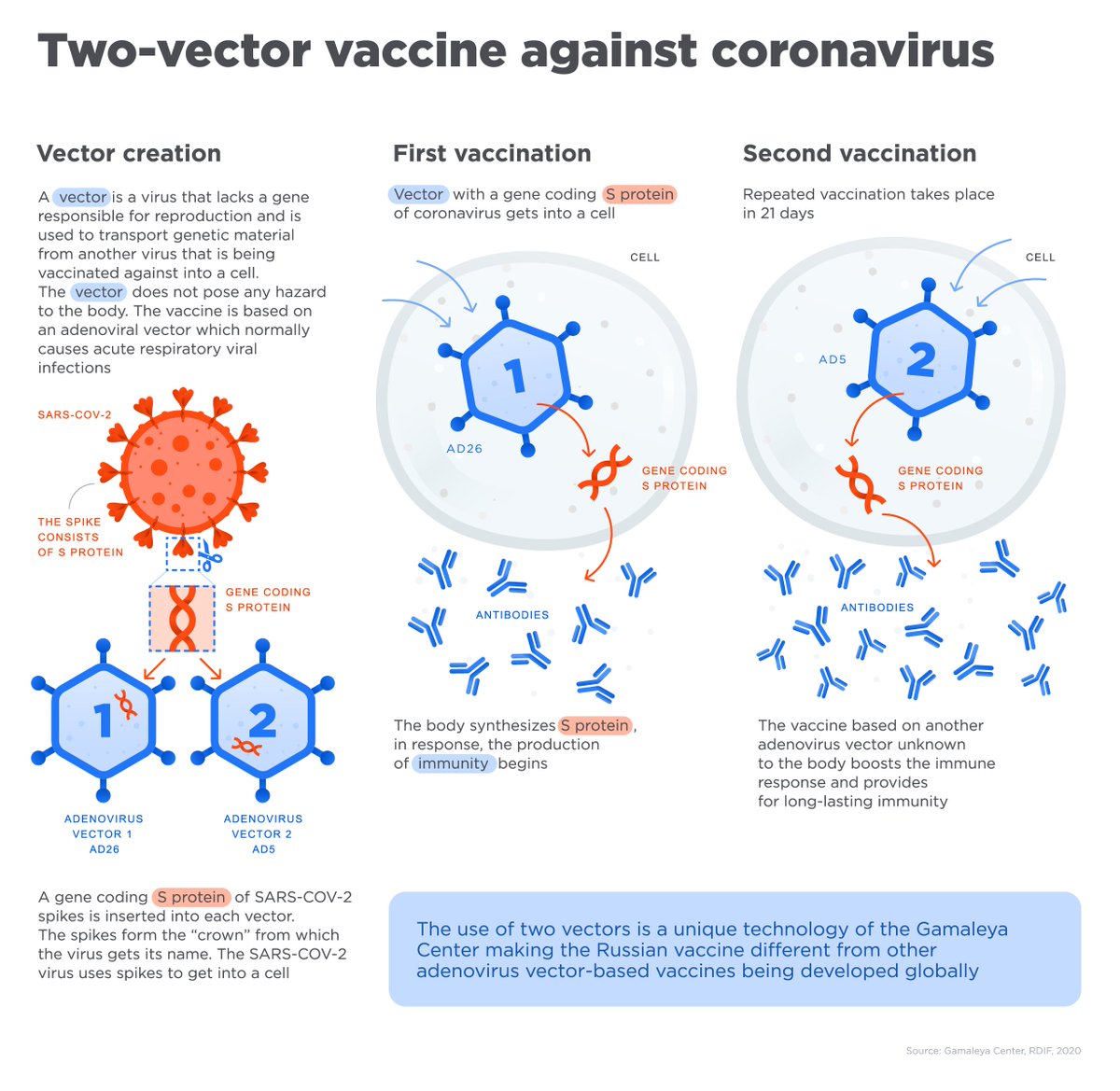Phase 3 data from the Sputnik V vaccine is out. ~92 efficacy. Even though we won't get this vaccine here in the US, it's still great news.
1. We need more vaccines globally.
2. It shows the value of a heterologous dosing regimen. What's that, you ask? https://www.thelancet.com/journals/lancet/article/PIIS0140-6736(21)00234-8/fulltext
1. We need more vaccines globally.
2. It shows the value of a heterologous dosing regimen. What's that, you ask? https://www.thelancet.com/journals/lancet/article/PIIS0140-6736(21)00234-8/fulltext
Heterologous prime-boost is a "mix and match" vaccine dosing schedule. You prime the immune response with a first shot of one vaccine, then boost with a different vaccine. In this case, it's two different adenovirus-vectored vaccines.
Adenoviruses are a family of non-enveloped DNA viruses that cause common colds. There are many different adenoviruses, and they can be engineered to safely deliver genes to a recipient via infection (in this case, SARS-CoV-2 spike).
They have been studied for years as both gene therapy vectors and vaccine vectors, and are safe to use. They have several key viral genes deleted to make them replication incompetent (they just express spike and don't establish a productive infection). They are safe.
Ad vectors are great, but there's a problem: adenoviruses are themselves viruses, so the immune system will also mount a response to the vaccine itself. Vector immunity can prevent subsequent boosters with the same Ad vector from expressing spike.
Vector immunity may explain why the full two-dose regimen of the AstraZeneca vaccine (also an Ad-vectored vaccine) was less efficacious than priming with a half-dose. Depending on the immunogenicity of the vector, many Ad-vectored vaccines may be a one and done situation.
Hence the utility of a heterologous dosing regimen. The Sputnik V vaccine uses two different Ad-vectored vaccines, Ad26 and Ad5 (see below). Any antibodies targeting the prime Ad26 vector will not be effective against the Ad5 booster.
To the best of my knowledge, there's no heterologous Ad-vectored vaccine regimen in late-stage trials for use in the US, so why should we care?
Well, there is an Ad26-vectored vaccine about to enter the market here. Johnson and Johnson.
Well, there is an Ad26-vectored vaccine about to enter the market here. Johnson and Johnson.
Now the J&J vaccine is very efficacious at preventing severe disease with one shot. But maybe it could be improved with a boost. While a 2-dose regimen is still in trials, we should anticipate potential issues with vector immunity.
And about those variants...
And about those variants...
All the major vaccine manufacturers have announced plans to develop boosters for the variants, which is very prudent considering the in vitro and clinical trial data showing reduced vaccine efficacy against some of those variants. We may need boosters in the future.
And if so, what are people who received J&J supposed to do? We likely can't vaccinate over and over again with the same Ad-vectored vaccine. So what's the solution?
Heterologous boosting.
Heterologous boosting.
While this study didn't look at heterologous boosting with a combination of vaccine platforms, we should start thinking now about it, as it has multiple advantages.
If you get J&J, can you then boost with Pfizer, Moderna, or (eventually, probably) Novavax?
If you get J&J, can you then boost with Pfizer, Moderna, or (eventually, probably) Novavax?
Can you mix a Pfizer or Moderna prime with a boost using another vaccine platform? The mRNA vaccines are becoming notorious for the second shot being less tolerable, so what about a 3rd shot? Could you improve side effects with a heterologous boost with a different vaccine?
Logistically, it may also be easier to implement heterologous boosting down the road, depending on supplies and access to the various vaccine candidates. People can get whichever booster is available to them immediately rather than wait for a dose of a specific vaccine.
Right now we don't have data on any of that, and it's greatly needed, so again it's terrific that vaccine manufacturers are reformulating boosters for the variants now. As they are evaluated, they should specifically look at heterologous dosing across platforms and manufacturers.
So this is great news even though it may not seem relevant to people in the US. Proof of concept for heterologous dosing does have implications for adapting to new emerging variants and for flexible and equitable vaccine access.
Furthermore, we should celebrate efficacious vaccines anywhere because of their broader effect. A pandemic by definition affects the whole world, and more vaccines in other countries get us closer to the global herd immunity threshold.
While my nostalgic self enjoys the Cold War Space Race vibes of the "Sputnik V" name, it's also fitting. My native-Russian-speaking spouse informed me that "sputnik" means "sojourner," which many people think means traveler but actually is defined as a temporary resident.
Vaccines are not sojourners, in that I hope they are here to stay. But vaccines can render the pandemic's residency temporary. I believe that SARS-CoV-2's sojourn in human hosts will be ended by vaccination, and I'm thankful for more promising news on this front.
(PS-One of my spouse's pet peeves is that American English speakers do not pronounce "sputnik" correctly. It's "spootnik" not "spuhtnik").
CORRECTION and moral of the story: don't rely on your biochemist/data scientist spouse for accurate Russian-to-English translation. https://twitter.com/angie_rasmussen/status/1356636541687226372?s=20

 Read on Twitter
Read on Twitter


